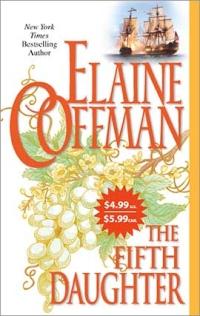 THE LOVE HATERS |
 Fall headfirst into July’s hottest stories—danger, desire, and happily-ever-afters await. |

Purchase
The Italian Chronicles #1 Romance Historical Excerpt of The Fifth Daughter by Elaine CoffmanAnd now thou art a nameless thing: So abject — yet alive! Lord Byron (1788-1824) English poet Samuel Livingston Bronwell, Esquire, was happy for a lot of things, but he had never been happier than he was the moment he arrived with his family back in Yorkshire. One week in London was too much. One week in London, visiting his dear wife's relations, was torture. Samuel and his wife had been talking quietly, when the coach suddenly slowed to a respectable pace. Both Samuel and his wife, Olympia glanced out the window and saw they were passing the cemetery. They looked quickly away as they passed the small group of people huddled around an open grave, where the Reverend Charles Constable presided over a funeral. But the Bronwell's oldest son, Stephen, had his nose pressed flat against the glass. "A funeral!" he said. "Who died, Papa?" "I don't know, son. Perhaps we will find out when we arrive home." On the opposite side of the coach, Mrs. Bronwell tugged at Stephen's sleeve. "Come away from the window. You mustn't stare, out of respect for the dead." Three-year-old Percy Bronwell, who had been sitting quietly beside his mother, decided to crawl over her to join his brother at the window. "You see?" she reprimanded. "Now your brother wants to look." Mrs. Bronwell put Percy on her lap and lowered the curtain over the window next to Stephen, and the carriage silently passed by the small gathering of grief, making its way on down the winding road. Several hours after they arrived home, Mr. Bronwell was relaxed in his study, blissfully happy to be back home, when his wife rushed into the room. "I had a short visit with Mrs. Throckmorton. She was in the neighborhood and stopped by. You will never believe what she told me." "To the contrary, my dear. I have learned never to dis- believe anything when women are involved, especially if one of them is Agnes Throckmorton." "Well, you won't believe what I am about to tell you, Mr. Bronwell. It was the Viscountess of Strath-more, God rest her soul, and I must tell you that I have never been more shocked than I was the moment I heard it." Samuel dropped the newspaper with a gesture that was both preoccupied and resigned, and gave his attention to his wife, because he knew she would not stop talking until he did so. "What did you say about the viscountess?" "The funeral, my dear husband. It was hers!" Equally shocked, he said, "You cannot mean Lady Strathmore is dead!" Olympia took that as an invitation and took a seat on the horsehair sofa across from him. "Dead and buried," she said. "And to think we took tea together only a few days before we left for London." She paused, reflective a moment. "Mrs. Throckmorton laid the blame at Lord Strathmore's feet. Can you believe she is dead, and it was all her husband's fault?" "Now, now, Olympia, careful what you say about the viscount. Although not too well liked, he is of an old and honorable family, and not the sort to murder his wife. To what purpose?" "Don't go defending him until you know the whole of it, or don't you want to know what happened?" Samuel was observing his wife with the look of a cornered dog. "It matters not. You will tell me regardless." As her husband indicated, Olympia went on to rattle off the story of precisely how it was that Lady Strath-more came to die, and the events that led up to that most unfortunate occurrence. She finished with a sigh and said, "When I think of how excited Teresa was about giving her husband a son at last, I want to cry. She was in perfect health when we left. A week later, she is dead. And the baby! Truly, I feel so sorry for that poor little, innocent waif…left with no mother, alone and helpless." "Poor choice of words, my dear. The child is hardly a waif. Her father is a viscount, so I doubt you could consider her to be abandoned." Olympia ignored that. "She is motherless and that is heartbreaking. What a terrible burden to heap upon a child." "What burden are you talking about?" "Mr. Bronwell, really! How can you not see how it will be for a child to grow up with the knowledge that she exists only because her father made a choice to let her mother die?" Her voice broke and she pulled a kerchief out of her pocket and dabbed at her eyes, then gave a shiver. "It's all so cold and callous. How could any man decree his wife's death?" "The child cannot be blamed for that." "And who, pray tell, is going to inform the child of that?" "You probably will, if she resides in the area long enough. However, I do agree that this is all quite tragic." "Oh, my dear, you haven't heard the tragic part yet. It seems the viscount locked himself in his study with lord knows how many bottles of whiskey the day the viscountess died." "That is understandable, and a long accepted manner for dealing with grief." "Not when it reeks of abandonment! The coward! He hid himself away, and left the staff at Hampton Manor to cope and care for that poor baby. As if secreting himself away like that could make him blameless, or ease his regret." "Some people choose to do so, because they cannot face the horror of the things they do." "I find this whole affair abominable. His poor wife barely dead and her infant daughter in need of looking after, and what does Lord Strathmore do? Locks himself in his study with a bottle of spirits, as if that would do either of them any good." "It's the guilt," Samuel said. "Tis said, the offender never pardons." "Good. He deserves to suffer, if you ask me. What kind of man could choose to let his wife die?" "A desperate one, it would seem. Do you not think part of the fault lies with that gypsy woman you mentioned? After all, if Mrs. Throckmorton is right, the gypsy is the one who told Lord Strathmore that the child the viscountess carried would be a son. I am sure that was in the back of his mind at the time he was faced with such a choice. And then there is the matter of Dr. Downing forcing Lord Strathmore to decide between his wife and child. I say the good doctor should have done all he could to save both of them. No one should be asked to play God. Surely you agree?" "I will have to think upon it, Mr. Bronwell." "The poor man is to be pitied, I suppose. He always wanted a son. He got daughters." "Serves him right. His own selfish desires were put ahead of the well-being of his wife. A son at all costs! Regardless the price his wife had to pay, poor woman." "I am certain the viscount is most grieved." "I don't believe that for a moment! Do you know he refuses to even see the baby? His own flesh and blood, and he has never even looked at the child. That goes beyond cruel." "Well, what's done is done," Samuel said. "I am sure Lord Strathmore will come to his senses and embrace his child ere long." Olympia harrumphed at that. "Mrs. Throckmorton said the viscount's housekeeper told her cook that Lord Strathmore would never accept the child. What need does he have for a fifth daughter?" "I daresay the viscount's housekeeper isn't the final word." "Perhaps not, but I also learned Reverend Constable was most concerned when he discovered the child was still unnamed. It's a sacrilege to allow such to happen. He said someone needed to see that the child was given a good, Christian name." Mr. Bronwell picked up his paper. "I have a suspicion Reverend Constable said that knowing you and Mrs. Throckmorton would be the first two to come forward with a list of suitable names. Am I right?" "Well," Olympia said. "Well, Agnes and I have given the matter some thought. And rightly so, considering we were both friends of Lady Strathmore's." Gossip spread across the moors faster than a summer fire, and the news that Viscount Strathmore had departed for London with his four older daughters, leaving the newborn baby behind, literally flew, as if borne by the fierce Yorkshire wind. It was on the following Sunday, that the dour, nonconformist minister of overly long prayers, avoided the subject of forgiveness in favor of the laxness of parents in seeing to the christening of their children. After too many beseech thees and just as many verilys the sermon was over. Afterward, Mrs. Throckmorton and Mrs. Bronwell approached the Reverend Constable and inquired about the status of the viscount's nameless daughter. "I have not been informed of any action on the matter. If no name is forthcoming, I shall take the matter to hand, and name the child myself." After Reverend Constable was called away, the two good ladies were appalled at the idea of the minister being involved in the naming, if for no other reason than the Reverend's own daughters were named Assurance, Loyalty and Devotion. With the utmost discretion, they decided to pay a call at Hampton Manor, where they asked to speak to the housekeeper, Mrs. Brampton. After a lengthy explanation of their purpose for being there, they asked if the minister had indicated he was considering naming the child himself. Excerpt from The Fifth Daughter by Elaine Coffman |
|
| |||
|
||||



 © 2003-2025
© 2003-2025